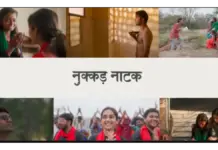UTV Motion Pictures and Pooja Entertainment And Films Ltd.’s Himmatwala (UA) is a remake of Himmatwala of the eighties. Ravi (Ajay Devgan) comes to Ramnagar to avenge the disgrace brought to his father, Dharam Murti (Anil Dhawan), years ago, by sarpanch Sher Singh (Mahesh Manjrekar), which had prompted him (father) to commit suicide. Ravi was a child then and had lived under the impression that his mother, Savitri, and sister were also dead but they had survived and were living in abject poverty on the outskirts of the village.
Ravi brings his mother (Zarina Wahab) and sister, Padma (Leena Jumani), back to their ancestral home in Ramnagar. But before that, he poses as a CBI officer from Delhi and threatens Sher Singh and his eccentric brother-in-law, Narayandas (Paresh Rawal).
As the drama progresses, Ravi falls in love with Rekha (Tamannaah Bhatia), daughter of Sher Singh. Padma is in love with Shakti (Adhyayan Suman), son of Narayandas. Like a dutiful brother, Ravi gets Padma married to Shakti despite the fact that Sher Singh and Narayandas had led his father to end his life. But Padma soon realises her folly when Shakti and Narayandas torture her physically and mentally. They even ask her to tell Ravi to withdraw from the panchayat elections so that he would not be able to defeat Sher Singh who, in any case, is hated by the villagers who have been exploited by him (Sher Singh) over the years. Ravi wants to teach Shakti the lesson of his lifetime for torturing his sister but their mother won’t hear of taking any extreme steps against the son-in-law.
It is then that Rekha steps in and asks Ravi to use her to teach her father a lesson. Rekha pretends to be pregnant with Ravi’s child so that Sher Singh has no option but to plead with Ravi to marry Rekha so as to save the family honour. However, Ravi keeps putting conditions before Sher Singh prior to agreeing to marry Rekha, solely with a view to humiliating him and getting the lost honour of his deceased father restored.
Then, Shakti overhears Rekha telling Ravi that he (Ravi) isn’t the real Ravi. Shakti spills the beans before his uncle, Sher Singh, who uses this piece of information to get back at Ravi. He exposes Ravi in front of the entire village. Ravi’s mother, Savitri, is shocked that the young man she had thought to be her son wasn’t her son. Meanwhile, Narayandas brings an army of street fighters to kill Ravi.
So what happens thereafter? Does Savitri forgive Ravi for impersonating her son? Do the street fighters kill Ravi? Does anyone come to Ravi’s rescue? Does Rekha support Ravi or her father? Does Padma support husband Shakti or brother Ravi?
The film’s story is the same as that of the old Himmatwala. The screenplay, penned by Farhad-Sajid and Sajid Khan, is too dated to appeal to today’s audience. It has the melodrama of the eighties, which has gone completely out of fashion today. Likewise, the coincidences, so much in vogue back in the eighties, look ridiculous today. For instance, Ravi has to fall in love with Sher Singh’s daughter as if there is no other girl in the village. While that is still somewhat understandable, if only because he tames her before falling in love with her, what isn’t is the love affair between Padma and the son of Narayandas who had brought disgrace to their family. Besides, Padma has barely come to Ramnagar, so when did she meet Shakti, interact with him and fall so madly in love with him? The entire track of the husband and father-in-law ill-treating the wife/daughter-in-law looks weird because Padma couldn’t have been so naïve as to not have expected that that could be a possibility. Also, the angle of Sher Singh trying to expose Ravi in front of the villagers looks contrived because it doesn’t concern the villagers who Ravi really is so long as he has done a world of good for them. The screenplay writers have tried to infuse comedy but the humour is so downmarket and so forced that the audience, especially the youth, would end up laughing at the humour, not with the comedy. The comic track of Narayandas, created due to his use of names of cities and towns (like, for instance, Dalhousie, Rajkot, etc.) in his dialogues, irritates the viewers no end. This track may have been the highlight in the old Himmatwala but three decades later, the track serves to agitate the audience because the dialogues sound weird.
There is a track of the tiger which may appeal to the masses but this very track will be found to be tacky and over-the-top by the city youth.
Actually, the entire drama is over-the-top and every character is loudness personified. Emotions fail to touch the heart. Romance is as good as missing. Action scenes would definitely appeal to the masses and front-benchers. Even some portions of the comedy would entertain the audience of the single-screen cinemas. Climax will appeal to a section of the masses only.
Dialogues, written by Farhad-Sajid and Sajid Khan, are dated and would’ve gone down well with the audiences 20 to 30 years ago.
Ajay Devgan is definitely not in his element. He seems to have tried to camouflage his embarrassment about being associated with this over-the-top drama. He is good in action scenes, fair in dramatic ones and embarrassingly bad in the dance sequences, especially in the ‘Naino mein sapna’ song. Tamannaah Bhatia makes a dull debut. She looks average, wears loud clothes in the initial reels and does a very average job. Her dances are okay. Paresh Rawal tries his best to be natural and succeeds to an extent. Mahesh Manjrekar is like fish out of water. Zarina Wahab is too melodramatic for comfort. Adhyayan Suman hardly impresses. Leena Jumani passes muster. Rajendra Gupta, Anil Dhawan and Vindoo Dara Singh lend ordinary support. Asrani fails to entertain. Chunkey Panday lends fair support. Amruta Khanvilkar, Surveen Chawla, Mona Tripha, Sayantani Ghosh and Rinku Ghosh would not create an impact in the ‘Dhokha dhokha’ item song because many amongst the audiences would not even be able to recognise them. Sonakshi Sinha is okay in the ‘Thank God, it’s Friday’ song.
Director Sajid Khan has tried to recreate the era of the eighties but has overlooked the fact that the audience has moved decades ahead. His narrative style caters to just a section of the single-screen cinema audiences. Sajid-Wajid’s music is ordinary. The two songs (‘Naino mein sapna’ and ‘Taki o taki’) from the old Himmatwala are not as exciting and energetic as the old numbers. ‘Dhokha dhokha’ is quite good. ‘Thank God, it’s Friday’ (composed by Sachin-Jigar) and ‘Bum pe laat’ are routine numbers. Lyrics (Sameer; ‘Thank God, it’s Friday’ by Mayur Puri) are okay. Song picturisations (Farah Khan, Chinni Prakash and Ganesh Acharya) are alright. Sandeep Shirodkar’s background music leaves something to be desired; it is too loud and, if one may say so, intruding sometimes. Manoj Soni’s cinematography is eye-filling. Jai Singh Nijjar’s action scenes and stunts will appeal to the masses. Sabu Cyril’s sets are good. Nitin Rokade’s editing is loose.
On the whole, Himmatwala faces a supremely uphill task at the ticket-windows. It will do well initially at the single-screen cinemas but will not find favour with the multiplex audience. Without much support coming in from the younger generation, it will go down in box-office history as a forgettable flop.
Released on 29-3-’13 at Regal (daily 4 shows), Eros (daily 4 shows), New Excelsior (daily 4 shows) and other cinemas of Bombay by UTV Motion Pictures. Publicity: good but not effective. Opening: very ordinary in multiplexes, fairly good in single-screen cinemas. …….Also released all over. Opening was alright in U.P., Bihar and parts of C.P. Berar but below the mark at other places.




























